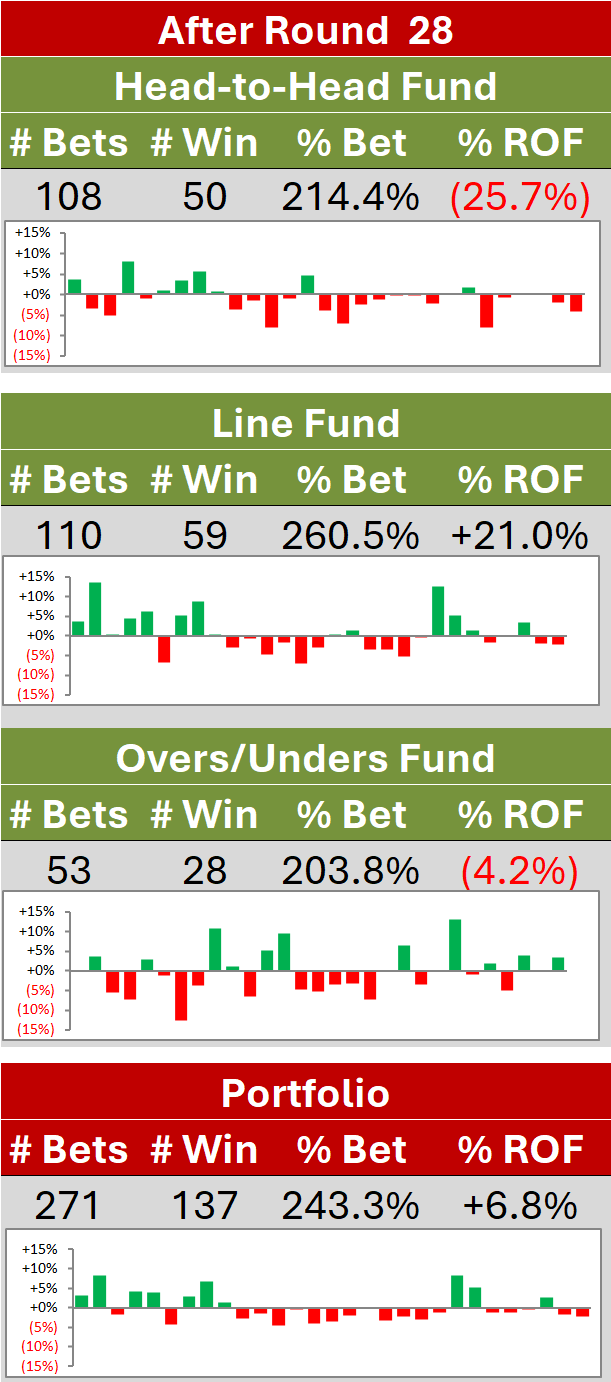Season End MoSSBODS Ratings: Premiers, Runners Up and The Rest
/There's really no answer to the question "Which was the best VFL/AFL team of period X?", but team rating systems like MARS and MoSSBODS provide at least evidence-based panels of candidate teams to argue about.
Even with systems like these that offer numerical ratings, however, there are still decisions to be made about whether ability is best measured by averaging ratings across an entire season or period, by considering only peak ratings, or by reviewing the ratings attained by teams at the end of complete season.
Using the MARS system, back in 2013 I proposed a list of the best and worst teams of all-time to that point by considering teams' absolute peaks (and troughs). Late in 2015 I used MoSSBODS to create a list, again based on peaks and troughs, of the best and worst defensive, offensive and overall teams from the period 2005 to 2015. Then, just a little later in that same year, I used MoSSBODS peak and trough ratings again, this time to investigate the link between abilities and overt success in the form of Flags, Grand Final appearances, and Minor Premierships.
That most recent analysis is the one most similar in spirit to today's where I'll be exploring the end-of-season MoSSBODS ratings of Grand Finalists, generally and specifically, and comparing them to the ratings of the teams that missed out.
Each dot on the chart that follows (which can be clicked to access a larger version) represents the season-end MoSSBODS Offensive and Defensive Ratings for a single team from a single season. Dots coloured grey represent teams that did not play in the Grand Final of their season (or, in seasons where there was no Grand Final, were not awarded the Premier or Runner Up positions), dots coloured orange represent teams that lost in the Grand Final (or otherwise finished Runner Up), and dots coloured red represent teams that won the Flag, however it was determined in that year.
A few macro features are immediately apparent:
- Teams' end-of-season Offensive and Defensive Ratings tend to be correlated (evidenced by the fact that the dots tend to fall around a diagonal). Numerically, the correlation is about +0.49, meaning that around 25% of the variability in the two Ratings is shared.
- Flag winners tend to be rated higher than Runners Up who, in turn, tend to be rated higher than other teams from their respective years. Flag winners, in fact, have had average end-of-season Offensive and Defensive Ratings of around +3.3, Runners Up of around +2.3, while the remaining teams have finished the season earlier with average Ratings or around -0.6.
- Only a handful of teams have finished seasons with both Offensive and Defensive Ratings of +5 Scoring Shots or higher.
Let's start by looking at those four teams:
- Essendon 2000 (Premiers) - Minor Premiers with a 21-0-1 record in the Home and Away season and a 159 PC. Post-season wins of 125 points over North Melbourne in the Qualifying Final, 45 points over Carlton in the Preliminary Final, and 60 points over Melbourne in the Grand Final.
- Geelong 2007 (Premiers) - Minor Premiers with a 18-0-4 record in the Home and Away season and a 153 PC. Post-season wins of 106 points over North Melbourne in the Qualifying Final, just 5 points over Collingwood in the Preliminary Final, and then a record-breaking 119 points over Port Adelaide in the Grand Final.
- Geelong 2011 (Premiers) - Runners Up to Collingwood with a 19-0-3 record in the Home and Away season and a 157 PC. Post-season wins of 31 points over Hawthorn in the Qualifying Final, 48 points over West Coast in the Preliminary Final, and then 38 points over Collingwood in the Grand Final.
- Geelong 2008 (Runners Up) - Minor Premiers with a 21-0-1 record in the Home and Away season and a 162 PC. Post-season wins of 58 points over St Kilda in the Qualifying Final, 29 points over the Western Bulldogs in the Preliminary Final, and then a surprise loss to Hawthorn by 26 points in the Grand Final.
(Note that the Collingwood 2010 premiership team only barely fails to make this group, their final Defensive Rating being +4.9 Scoring Shots.)
Essendon finished the 2000 season with a +8.7 Scoring Shot Offensive Rating, a figure bettered by only one team in history: the Richmond 1967 premiership team, whose final Offensive Rating was +9.4 after they'd completed a season scoring, on average, more than 10 points per game more than any other team. The Geelong 1989 Runners Up went close to the Dons' mark, their final Offensive Rating being +8.6 Scoring Shots.
The highest-ever end-of-season Defensive Rating belongs to the St Kilda 2009 team, who finished as Runners Up to Geelong in that year. The Saints finished with a +8.0 Defensive Rating having conceded 400 points fewer than any other team during the 22-round Home and Away season.
As we might expect, no team has won the Flag with both Offensive and Defensive Ratings negative, though a handful have gone close:
- Fitzroy 1904 (Offensive +1.1, Defensive +0.0) - finished the regular season with a 10-0-4 record, and then the Sectional rounds with a 12-0-5 record (the competition was more complicated then) before winning a Semi-Final by 11 points against Collingwood, and then a Grand Final by 24 points against Carlton.
- Collingwood 1958 (Offensive +0.5, Defensive +1.2) - finished the regular season as Runners Up with a 12-0-6 record and just a 124 PC before losing a Semi-Final to Melbourne by 45 points and then recovering to defeat North Melbourne by 20 points in a Preliminary Final and then avenging their Semi-Final loss by toppling Melbourne by 18 points in the Grand Final.
- Carlton 1972 (Offensive +1.1, Defensive +0.4) - finished the regular season as Minor Premiers with an 18-1-3 record but just a 134 PC before drawing with Richmond in the Semi-Final and then going down by 41 points in the replay. Under the five-team Finals system operating then, as Premiers they were entitled to a second chance that came in the form of a Preliminary Final against St Kilda, which they won by 16 points (having trailed at half-time). In the Grand Final they defeated Richmond by 27 points after conceding 150 points and registering fewer Scoring Shots (37 to the Tigers' 40).
No Runner Up has finished with both Offensive and Defensive Ratings negative either, though 14 having finished with a negative Offensive Rating and 11 with a negative Defensive Rating.
The lowest Defensive Rating for a Runner Up belongs to the North Melbourne 1976 team. Their Rating was - 2.8 Scoring Shots. They finished the regular season with a 15-0-7 record and a 117 PC, lost to Hawthorn by 20 points in the Qualifying Final, beat Geelong by 33 points in the Semi-Final (but registered only 3 more Scoring Shots), and lost to Hawthorn by 30 points in the Grand Final registering 15 fewer Scoring Shots.
(The 1960 Collingwood team had only a marginally higher Defensive Rating. They went 11-0-7 in the regular season, finishing fourth with a 114 PC. They beat Essendon by 9 points in the Semi-Final, Fitzroy by 5 points in the Preliminary Final, and lost to Melbourne by 48 points in the Grand Final registering only 4 Scoring Shots while conceding 22 of their own.)
Turning lastly to teams that finished neither as Premiers or Runners Up we find that the lowest ever end-of-season Offensive Rating of -8.1 Scoring Shots belongs to the GWS 2012 team, who took the Spoon that season with a 2-0-20 record and a 46 PC, For the lowest ever end-of-season Defensive Rating we need to go back over a century more where we find the 1899 St Kilda team with a -12.0 Scoring Shot Rating. It should be noted that the 1898 St Kilda team had finished with a -9.5 Scoring Shot Rating, so the 1899 Saints started with a considered Rating handicap, but their 0-0-14 record and 28 PC in the regular season, and their 0-0-3 and 10 PC in the Sectional rounds, would seem to justify MoSSBODS' opinion.
We'll finish on a somewhat more positive note by looking at the highest Rated teams to miss out on Grand Finals, which were:
- Richmond 1968 (Offensive +7.0, Defensive +1.3) - finished the regular season just outside the Top 4 with a modest 14-0-6 record but having outscored all four of the Finalists.
- Adelaide 2005 (Offensive +0.3, Defensive +6.9) - finished the regular season as Minor Premiers with a 17-0-5 record and a 137 PC having conceded 150 points fewer than any other team and as many as 700 fewer than some other finalists. They lost by 8 points to St Kilda in a very low-scoring game in the Qualifying Final, defeated Port Adelaide by 83 points in the Semi-Final, conceding only 15 Scoring Shots, then lost to West Coast by 16 points in the Preliminary Final.
There are other dots on the chart that might be interesting to explore, but I'll leave those for another day. In the meantime, if there's any particular team you're interested in, please feel free to leave a comment on this post or to send me an e-mail.

